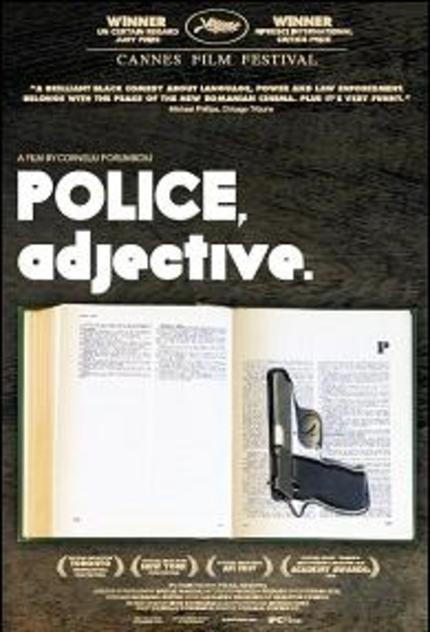POLICE, ADJECTIVE review

There's a key passage of dialogue towards the end of Corneliu Porumboiu's Police, Adjective that serves as an unfortunate way of summing up the film. A police captain tries to verbally overwhelm his rebellious subordinate but at the last minute has to scramble to cover up one little bit of evidence that doesn't agree with him. It's a long breath of hot air cut off by an inconvenient truth, only then things still wrap up the way we thought they would anyway.
Fans of Eastern European cinema will probably know Romania's produced several critically acclaimed films in recent years lambasting the fallacies of a hide-bound bureaucracy, but Police, Adjective is like a parody of the form. Technically it's hard to fault - Porumboiu's direction and his cast are a model of formal realism - but it's so achingly dry it beggars belief. Lacking any real warmth or any fine detail that's not meant to make a point, the film convinces neither as an intellectual treatise nor a piece of objective mockumentary.
Cristi (Dragos Bucur, recently seen in Peter Weir's The Way Back) is a policeman assigned to shadowing a group of young students known to the department as minor cannabis traffickers. He's trailed them for several days now, but hasn't found any solid proof of who's specifically responsible for what (who uses, who deals, who purchases and so on). Knowing his boss will come down heavily on the side of the law regardless, Cristi stalls as long as he can before having to present his recommendations, but he knows he's due a confrontation over the case sooner or later.
And this is largely it. Not merely in the sense this is an arthouse production devoid of action or melodrama, though obviously there is that. It's more that Porumboiu pares events down to the absolute bare minimum needed to convey what's going on, to the point he seems to leave no flesh on the narrative at all. Cristi follows his suspects, requests paperwork from his colleagues and eats in between, whether alone at the table or keeping his wife company. Beyond that there's barely anything there.
There are clear nods to the existentialist dilemmas facing people in authority in the old Communist bloc; the premise that authority stems from an individual definition of what purpose the authorities fulfil, and how farcical the knock-on effects of this can get. But the discussions or dilemmas in the script that advance these ideas are so jarring - the only time people speak or consider anything at length is to make a point - that they can't help but seem unbelievably forced.
Porumboiu portrays a system seemingly so self-absorbed the people on top are convinced they are their job, that they have all the answers, and where the people underneath them have let this go on for so long they no longer possess the conviction to challenge anyone in power. But he doesn't give us any sense of how things came to be this way, or of what it's really like to live in such a system.
Dragos Bucur is convincing enough, dumbly going through the motions even though he senses trouble and the rest of the cast are solid, if undistinguished. But they can't liven up a script so devoid of emotion there's barely anything to empathise with. There's no sense of any prior conflict beyond offhand references to establish Cristi doesn't get on with his boss. There's no indication Cristi genuinely feels for his targets beyond his mentioning it'd be a crying shame to prosecute them for want of any worse offence.
Perhaps the most frustrating thing about the film is it turns on a speech, yet that speech isn't particularly interesting, much less convincing. Obviously the point is that one character manipulates language to suit his needs and the other can't quite grasp how it is that, without that clarity of purpose, he can't find any counterpoint to claim a word actually means this, rather than this. But the whole thing just comes across as petty and insignificant, without anything to suggest that in itself conveys a message. There's no barbed wit, no black humour, and nothing seems to be at stake, least of all anyone's moral centre.
Doubtless Police, Adjective will find its fans, but it's anyone's guess what they'll see in it. You can see the point and appreciate the craft to some extent, but there's next to no content here to engage with. Characters who baldly argue, apropos of nothing, about linguistic points of order don't automatically make for an incisive piece of social commentary. Other than devoted fans of filmmakers from the region, it's near impossible to recommend this to anyone.
(Thanks go to Artificial Eye for facilitating this review.)

Do you feel this content is inappropriate or infringes upon your rights? Click here to report it, or see our DMCA policy.






